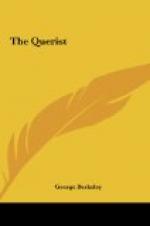229. Qu. Whether that, which increaseth the stock of a nation be not a means of increasing its trade? And whether that which increaseth the current credit of a nation may not be said to increase its stock?
230. Qu. Whether it may not be expedient to appoint certain funds or stock for a national bank, under direction of certain persons, one-third whereof to be named by the Government, and one-third by each House of Parliament?
231. Qu. Whether the directors should not be excluded from sitting in either House, and whether they should not be subject to the audit and visitation of a standing committee of both Houses?
232. Qu. Whether such committee of inspectors should not be changed every two years, one-half going out, and another coming in by ballot?
233. Qu. Whether the notes ought not to be issued in lots, to be let at interest on mortgaged lands, the whole number of lots to be divided among the four provinces, rateably to the number of hearths in each?
234. Qu. Whether it may not be expedient to appoint four counting-houses, one in each province, for converting notes into specie?
235. Qu. Whether a limit should not be fixed, which no person might exceed, in taking out notes?
236. Qu. Whether, the better to answer domestic circulation, it may not be right to issue notes as low as twenty shillings?
237. Qu. Whether all the bills should be issued at once, or rather by degrees, that so men may be gradually accustomed and reconciled to the bank?
238. Qu. Whether the keeping of the cash, and the direction of the bank, ought not to be in different hands, and both under public control?
239. Qu. Whether the same rule should not alway be observed, of lending out money or notes, only to half the value of the mortgaged land? and whether this value should not alway be rated at the same number of years’ purchase as at first?
240. Qu. Whether care should not be taken to prevent an undue rise of the value of land?
241. Qu. Whether the increase of industry and people will not of course raise the value of land? And whether this rise may not be sufficient?
242. Qu. Whether land may not be apt to rise on the issuing too great plenty of notes?
243. Qu. Whether this may not be prevented by the gradual and slow issuing of notes, and by frequent sales of lands?
244. Qu. Whether interest doth not measure the true value of land; for instance, where money is at five per cent, whether land is not worth twenty years’ purchase?
245. Qu. Whether too small a proportion of money would not hurt the landed man, and too great a proportion the monied man? And whether the quantum of notes ought not to bear proportion to the pubic demand? And whether trial must not shew what this demand will be?
246. Qu. Whether the exceeding this measure might not produce divers bad effects, one whereof would be the loss of our silver?




